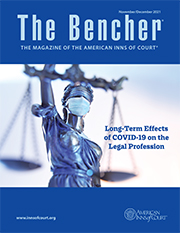Zoom Hearings: Might They Survive the End of the Pandemic?
The Bencher—November/December 2021
By Raffi Melkonian, Esquire

 Most lawyers have become extremely familiar with Zoom oral arguments and hearings during the COVID-19 pandemic. Justice cannot wait forever—for criminal and civil litigants alike—and courts and lawyers have found new stores of creativity to keep cases moving in these difficult circumstances. Even when things went wrong, lawyers and judges have made the best of their inevitable mistakes. “Lawyercat,” a viral Zoom mishap in which a lawyer appeared in court as a small, white, and very upset cat, may live forever as a fond memory for the COVID-19 generation. But many lawyers are eager to get back to in-person hearings and oral arguments as soon as the pandemic finally runs its deadly course. They cite the need to pick juries in person, to see and talk to opposing counsel, and to persuade their judges in-person. And, at the bottom of it, there’s just plain old habit. As a matter of temperament, law is a conservative profession, and lawyers are loathe to change what has worked for so many hundreds of years.
Most lawyers have become extremely familiar with Zoom oral arguments and hearings during the COVID-19 pandemic. Justice cannot wait forever—for criminal and civil litigants alike—and courts and lawyers have found new stores of creativity to keep cases moving in these difficult circumstances. Even when things went wrong, lawyers and judges have made the best of their inevitable mistakes. “Lawyercat,” a viral Zoom mishap in which a lawyer appeared in court as a small, white, and very upset cat, may live forever as a fond memory for the COVID-19 generation. But many lawyers are eager to get back to in-person hearings and oral arguments as soon as the pandemic finally runs its deadly course. They cite the need to pick juries in person, to see and talk to opposing counsel, and to persuade their judges in-person. And, at the bottom of it, there’s just plain old habit. As a matter of temperament, law is a conservative profession, and lawyers are loathe to change what has worked for so many hundreds of years.
As tempting as it might be to return to the familiar, it might be worth thinking again before we dive back into only in-person arguments and hearings. There are several reasons why courts and judges should keep video conference technology as one of their many tools. First, consider access to justice. For large corporations, paying their lawyers to travel to far-flung hearings is doubtless a burden but one that can be borne. That is what legal budgets are for. But an individual or a small business embroiled in a lawsuit is not so lucky. Every dollar that goes into paying for their lawyer to travel hundreds of miles is another dollar taken away from family obligations, business investments, or even just the money needed to resolve the case.
To be sure, litigation is expensive, and travel is sometimes the cost of doing business. But should the profession require clients to pay for a lawyer to travel to a five-minute status conference? To announce a settlement in court? To watch the court enter an agreed judgment? None of those benefit from in-person involvement, and yet they cost hundreds or thousands of dollars and hours of time. Video conference hearings solve this imbalance without changing the core of the legal experience. And even if that were not true, the potential environmental and work-life balance benefits of video conferencing should play a role in our analysis. A lawyer who needs to travel less often reduces reliance on air travel and likely is happier and healthier too.
Courts are public institutions that need the public to believe in them and their integrity to work. What we have learned over the pandemic is that showing people their courts increases that trust. Texas provides a great example. Over the past two years, regular citizens have been able to watch trials and other court proceedings of all kinds from their homes. Many, perhaps a surprising number, did. And the feedback most lawyers have heard has been positive. Members of the public were impressed with the hard-working and dedicated judiciary and lawyers.
The same has been true of appellate proceedings. This past year brought us many high-profile legal cases with elevated stakes. The fact that these proceedings were live-streamed helped, rather than hurt, the population’s acceptance of the results. Whatever small risk there might be of grandstanding was far outweighed by the public benefits.
This doesn’t mean that every hearing or proceeding should be held online. It might well be that criminal matters should transition back to in-person as soon as possible so that the rights of the accused are not infringed. And I can understand that a skilled trial lawyer may want to look into the whites of a venire member’s eyes before deciding that he or she is the right juror for the client’s crucial case.
Some judges believe that the majesty of arguing an appellate case in the marble palace of the courthouse imbues the proceedings with a seriousness that cannot be replicated by a head in a box online. We can pick and choose what proceedings can be online and which should be brought back “live.” But we should make that choice deliberately and not simply as a reflex. The pandemic has given us a chance to think hard about settled practices, and we should take that chance.
Raffi Melkonian, Esquire, is an appellate partner at the Houston, Texas, law firm of Wright, Close & Barger LLP. He litigates appeals in the state and federal courts of Texas and around the United States. He can be reached at melkonian@wrightclosebarger.com. He is a Master of the Bench member of the Garland R. Walker American Inn of Court.